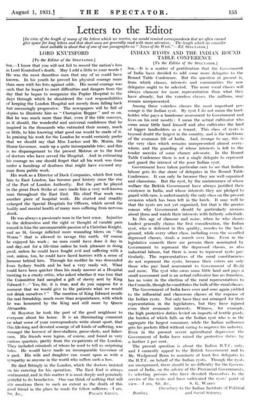INDIAN RYOTS AND THE INDIAN ROUND TABLE CONFERENCE [To the
Editor of the SPECTATOR.] SIR,-It is a matter of gratification that the Government of India have decided to add some more delegates to the Round Table Conference. But the question at present is, from which classes, interests and communities the new delegates ought to be selected. The more vocal classes will always clamour for more representation than what they have already, but the voiceless classes, the millions, may remain unrepresented.
Among these voiceless classes the most important per- sonage is the Indian ryot. By ryot I do not mean the land- holder who pays a handsome assessment to Government and lives on his rent mostly ; I mean the actual cultivator who owns some little land himself and also cultivates the land of bigger landholders as a tenant. This class of ryots is beyond doubt the largest in the country, and is the backbone of the economic life of India. And, strange to say, this is the very class which remains unrepresented almost every- where, and the guarding of whose interests is left to the tender mercies of some chance advocate. In the Round Table Conference there is not a single delegate to represent and guard the interest of the poor Indian ryot.
Government have taken particular care to see that Indian labour gets its due share of delegates in the Round Table Conference. It can only be because they are well organized and clamorous. But the ryot, by the maintenance of whose welfare the British Government have always justified their existence in India, and whose interests they are pledged to guard with care, is unfortunately the only class on the present occasion which has been left in the lurch. It may well be that the ryots are not yet organized, but that is the greater reason why Government should be particularly anxious about them and watch their interests with fatherly solicitude. In this age of clamour and noise, when he who shouts loudest generally claims the first consideration, the Indian ryot, who is deficient in this quality, recedes to the back- ground, while every other class, including even the so-called depressed classes, steals a march over him. Even in the legislative councils there are persons there nominated by Government to represent the depressed classes, as also industrial labour, but there is none to represent ryots par- ticularly. The representatives of the rural constituencies do not represent the ryots, because their voters are only those who pay land assessment to Government of lis.:32 and more. The ryot who.owns some little land and pays a small assessment and is an actual cultivator has no franchise, has no voice in the election of the rural representatives to the Councils, though he constitutes the bulk of the rural classes.
The Government of India have over and over again yielded to the influential and clamorous classes at the expense of the Indian ryots. Not only have they not arranged for their representation in the legislatures, but they have injured even their economic interests. Witness, for example, the high protective duties levied on imports of textile goods, the burden of which falls on the Indian ryot who is in the aggregate the largest consumer, while the Indian millowner gets his pockets filled without caring to improve his industry. Even in the present severe agricultural depression the Government of India have raised the protective duties by a further 5 per cent.
The present question is about the Indian R.T.C. only, and I earnestly appeal to the British Government and to Mr. Wedgwood Berm to nominate at least five delegates to the R.T.C. on' behalf of the Indian ryots. Though the ryots are unorganized, there should be no difficulty for the Govern. ment of India, on the advice of the Provincial Governments, selecting persons who have devoted themselves to the service of the ryots and have cultivated the ryots' point of
(Secretary to the Indian Institute of Political
Bombay. and Social Science).


































 Previous page
Previous page